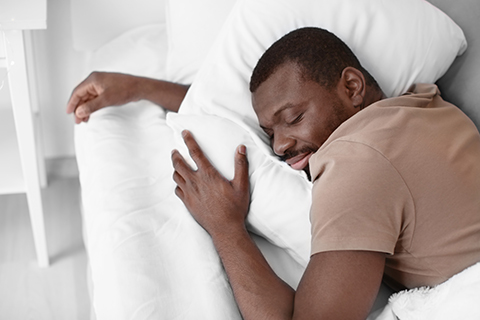National Center for Health Promotion and Disease Prevention
Sleep Well
Sleep difficulties are very common, can cause problems with daytime functioning and may contribute to many other medical conditions. There is help available for the two most common sleep issues - insomnia and obstructive sleep apnea.
What's Important to Know?
Maintaining Healthy Sleep
Getting high quality sleep is key for good health. Sleeping well is just as important as exercise and eating wisely. If you are already getting quality sleep, here are some tips to help you continue sleeping well:
- Allow yourself enough time to sleep at night.
- Keep a regular sleep schedule every day.
- Allow time to unwind before bed.
- Avoid alcohol and caffeine before bedtime.
- Exercise regularly.
- Avoid napping.
- Keep the bedroom quiet, dark, and comfortable.
- Avoid using electronic devices in the bedroom (TV, cell phones, tablets, computers). White noise from fans or sound machines is fine.
- Use the bed only for sleep and intimacy.
- Identify stressors & continue to manage stress.
Poor Sleep Is Related To:
- Obesity
- Heart disease and stroke
- Diabetes
- Pain
- Depression, anxiety, and irritability
- Concentration and memory problems
- Accidents and impaired work performance
Want to Know More?
One in three people have problems sleeping at some point in their lives. There’s a big difference between one night of poor sleep and trouble that persists. If your sleep trouble goes on for months, you may have a sleep disorder. Concerned about your sleep? VA’s Sleep Check-Up Tool can help you understand it.

The two most common sleep disorders are:
Insomnia Disorder and Obstructive Sleep Apnea Disorder.
Insomnia symptoms include difficulty with:
- Falling asleep
- Staying asleep
- Waking too early
Obstructive Sleep Apnea is a sleep disorder caused by blocking of the airway during sleep. Symptoms can include:
- Loud snoring
- Excessive daytime sleepiness
- Observed episodes of stopped breathing during sleep
- Waking up gasping or choking
- Difficulty concentrating during the day
Effective treatments are available for both Insomnia and Sleep Apnea.
Talk to your health care team to learn about alternatives to sleep medications, including virtual insomnia treatment options.




















